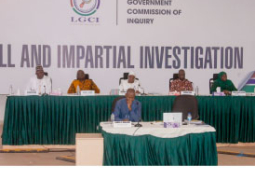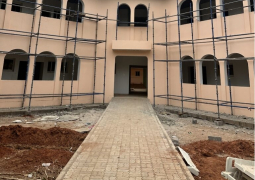
In her ruling, she told the court that the first accused person, Yakumba Jaiteh, was charged on count one for the offence of assault punishable with two years imprisonment contrary to Section 230 ( E ) of the Criminal Code. She stated that on count two, Yakumba Jaiteh was charged together with Yusupha Jaiteh for the offence of obstruction of inspectors contrary to Section 62 ( 1 ) ( a ) of the Drug Control Act.
She further posited that the particulars of offence on count one alleged that on or about the 6th day of October, 2020, at Kololi and diverse places, in the Kanifing Municipality of the Republic of The Gambia, she unlawfully assaulted one Ebrima Fadera, a narcotic officer, by holding his neck while he was on due execution of his duties.
She went on to say that on count two, Yakumba Jaiteh and Yusupha Jaiteh were alleged to have, on or about the 6th of October, 2020, at Kololi and diverse places, in the Kanifing Municipality of the Republic of The Gambia, unlawfully and without reasonable excuse obstructed the following inspectors: Lamin Manjang, Landing Tamba, and Sisawo Nyabally, all narcotic officers, while they were on due execution of the duties.
She stated that both the accused persons pleaded not guilty to the offences they were respectively charged with. To prove its case, she went on, the prosecution called six witnesses and tendered exhibits A-C which were: a prescription paper, a receipt and a medical report, all bearing the name of Ebrima Fadera, the first prosecution witness.
She said that the defence, through the prosecution witnesses, tendered defence exhibits 1-6 which were the witness statements of PW 1, PW 2, PW 3, PW 4 and PW 6 and the warrant card of PW 1.
At the end of the prosecution’s case, she told the court, the defence opted to make a no-case-to-answer submission pursuant to Section 166 of the CPC and they argued orally. She said that the prosecution also replied to the no-case-to-answer submission orally. “Both parties in their respective arguments urged the court to rule in its favour,” she stated.
She further declared that having carefully gone through the entire evidence adduced by the prosecution, and having also carefully considered the arguments made by both the defence counsel and the prosecution, and also bearing in mind the essential elements of the offences charged, it was her view that the sole issue for determination at that point was whether the prosecution had made out a prima facie case requiring the accused persons to be called upon to open their defence.
“A prima facie case is simply the establishment of a legally required rebuttable presumption. It is a flexible evidentiary standard that measures the effect of evidence as meeting, or tending to meet, the prosecution’s burden of proof on a given issue sufficient to justify a conviction, provided that such evidence is not rebutted by the defence,” she said.
She further posited that from this definition, to decide whether or not to uphold a no-case submission, the test to be applied was whether there was evidence which, if accepted, would provide evidence of each element of the charge. Even if there was such evidence, she said, it may be so lacking in weight and reliability that it was open to the court as a matter of discretion to dismiss the charge. “Thus, at this stage, I will not deal with the credibility or not of the witnesses adduced by the prosecution or on the weight of their evidence. I will just look at whether the witnesses adduced by the prosecution have been discredited under cross-examination and consider whether their evidence is manifestly unreliable that it would not be safe for the court to rely on,” she declared.
She adduced further that she had considered the submissions on both sides and authorities relied on. “I have also considered the above definition of what constitutes a prima facie case. Having carefully gone through the entire evidence adduced by the prosecution, and without wishing to go into the fact of the case, I find that there is a prima facie case made out against the accused persons that is sufficient to call upon the accused to enter a defence. Accordingly, the no-case-to-answer submission is dismissed and I call upon the accused persons to enter their defence pursuant to Section 167 of the CPC,” she said.
It could be recalled that ASP Jahateh on the 19th May, 2021, replied on the no-case submission made by the defence counsel, Yankuba Darboe. He argued that the prosecution had established a prima facie case to warrant the accused to enter their defence.
The defence counsel, on the other hand, submitted that the prosecution witnesses were discredited through cross-examination. He further said that they contradicted themselves in their testimonies.
But ASP Jahateh did not agree at all. In his deliberation, he posited that the matter was adjourned for reply. He adduced that from the totality from the evidence of the six prosecution witnesses, it was such points to be deduced from the evidence.
He argued that the first accused, Yakumba, was on the scene and accosted that her brother would not be arrested. He said that the second accused, Yusupha Jaiteh, was put on the scene by the witnesses. “From the evidence of Ebrima Fadera, there was an assault. The prosecution evidence indicates that the arresting officer was held during an ordinary hour on the scene,” he told the court.
He further stated that the issue to be determined was whether the prosecution had established a prima facie case for the accused to enter their defence. He cited Section 166 of the Criminal Procedure Code to support his argument. “Section 166 clearly states that if at the closure of the prosecution case the prosecution has not made a case against the accused persons, the court shall acquit them. But according to Section 167, if the prosecution has made a case against the accused persons, the accused shall be called upon to defend themselves,” he submitted.
He posited that what was presented by the prosecution called for explanation by the accused persons. He argued that once the prosecution has established the minimum requirement of the ingredient and element of the offences charged, the defence is required to be heard. He cited a Nigerian case to convince the court.
“There are several decisions warranting the court to discharge the accused persons after a no-case submission. It is clear from the evidence adduced that the facts need some explanation which the accused should make with the view of the evidence adduced. It is the judge’s duty when a no-case submission is made to discharge an accused where the evidence adduced does not disclose minimum evidence establishing the facts of the offence charged,” he submitted.
He told the court that the evidence of the witnesses connected the accused to the offences charged. He stated that the cross-examination by the defence did not shake the witnesses in the dock. “For a no-case submission to succeed, three requirements must be met. One, the prosecution must have failed to establish the ingredient and element of the offence charged. Two, the evidence of the prosecution must have been thoroughly discredited so much that it will not be necessary for the accused to open their defence. Three, the prosecution witnesses must be so incredible for a reasonable court to convict the accused. These are laid down principles in the English Practice Note 1962,” he argued.
He noted that the evidences of the prosecution witnesses were not at all discredited through cross-examination. “The elements of the offences charged have been established against the accused persons. The question one should ask is whether this piece of evidence calls for explanation on the part of the accused persons. The answer is certainly yes,” he said.
He further adduced that all what the prosecution needed was to establish a prima facie case to invite the accused to open their defence. “On the term prima facie, we refer the court to the case of Godwin Chianugo versus The State 2006, ICCPR page 62,” he said.
“When a submission of no-case is made on behalf of an accused person, the trial court is not dare call an opinion on any evidence. The court is to rule accordingly that there is before the court no legally admissible evidence linking the accused to the offence charged. If the submission is based on discredited evidence, such evidence must be apparent on the face of the record. If this is not the case, it will fail. It is our submission that there is nothing on the face of the record that the evidences are so discredited that they render the eventual argument of the prosecution valueless,” ASP Jahateh told the court.
Well armed with legal authorities, he posited that if the court was not satisfied by going by what was placed before the court, and there was no legally admissible evidence at all against the accused, the court was bound to acquit the accused. “In such instance, refusing the application and calling the accused to enter their defence would be tantamount to placing the accused on the onus to establish their innocence,” he stated.
If on the other hand, he went on, there was legally admissible evidence devoid of hearsay, the court was obliged to call upon the accused to enter their defence. “We therefore urge the court to discountenance the submission of the defence and ask the accused to enter their defence,” he concluded.
On points of law, Yankuba Darboe, the defence counsel, rose and told the court that the starting point was Section 166 of the Criminal Procedure Code. He argued that this section avails the accused the right to make a no-case submission. “The prosecution has stated that all what they need is to establish a prima facie case against the accused. What is essential is that the prosecution should prove the ingredient and element of the offence charged. Secondly, the evidence of the prosecution must not be discredited. The evidence of the prosecution witnesses was discredited because one of them lied. They contradicted themselves,” Counsel Darboe argued.
He further noted that the only evidence presented linking the accused to the offence was the oral evidence but not the documents tendered. “The prosecution has woefully failed to establish a prima facie case against the accused. We submit that the requirement of the defence is to prove the innocence of the accused. We beg the court to grant our application,” he adduced.
The case was adjourned to the 30th June, 2021, for the accused persons to enter their defence.




